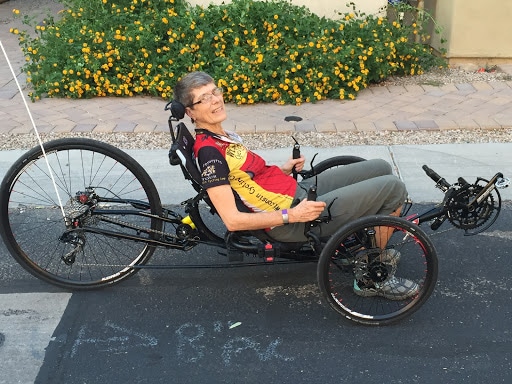Co-authored by: Susan Reed and Joshua Bourn
Meet Susan Reed, 71, from Tucson, Arizona. Susan was diagnosed with Temporal Lobe Epilepsy (TLE) when she was 68 years old. According to her research, she is among the 60 percent whose reason why she developed epilepsy remains unknown.
Initial Diagnosis
Susan returned from one of her regular daily bike rides of at least 50 miles (she has ridden 10-12,000 miles a year for the last 10 years). All she remembers is when her husband came home from work, the house was in disarray, and she was sitting in a living room chair, confused, with no memory of what had happened; everything, both visually and mentally was a total blur.
After spending 20 hours in the Emergency Room (ER) she was sent to a local hospital for an Electroencephalogram (EEG). To her shock and dismay, the EEG confirmed the diagnosis of Bilateral Temporal Lobe Epilepsy.
Not Your Typical Third Wheel
Yes, Susan has epilepsy, but epilepsy does not have her. After she had her first seizure while riding her two wheel bike, she knew it was time to transition to a high performance trike. She knew, too, that with epilepsy, she was a potentially impaired driver. Arizona’s minimum requirement to drive with an epilepsy diagnosis is 90 days. Given the frequency of her seizures, Susan has not driven for nearly 4 years. She would not put herself, other cyclists, or motorists in danger while driving. She has, however, continued to ride her trike 12,000+ miles a year.

Susan has always flown with her bikes to ride long distances and tours. To continue her joy in riding in this manner, she must be able to fold her trike to fit in the family car and stow on airplanes.
Doctors, Treatment and Medicine
Like most diagnosed with epilepsy, Susan’s experience finding a medication, and combination of medications and an effective dosage, is both a science and an art. After much trial and error, Susan is now on a combination of Keppra and Lamictal, which is currently holding most seizures at bay.
Adversity
Being unable to drive is the biggest adversity. Susan retired twelve years ago at age 59. Her three children are grown and rearing their own children. She says if she were still working full-time and being mom to her three children, she would incur much more adversity than she does now. Living in Tucson, one of the most bike-friendly cities in the USA, she can ride her trike anywhere she needs to go…as long as her trike is in her possession. Not long ago, Susan’s trike was stolen by a professional thief. Luckily, her homeowners insurance and her local bike shop were able to replace her trike from the UK within 2 weeks.
Support
Susan’s husband is her best friend and primary supporter. Her cycling community is another important source of support. They transport her and her trike to the start and home again for cycling events too far for her to ride to. They also ride with her on her daily or long distance rides when she senses she is vulnerable to a seizure or has experienced seizure activity.
Tips and Tricks
Susan says, “Live your Life! Continue to do whatever it is that gives purpose to your life and is an expression of your passion.” For parents of kids with epilepsy, Susan urges them not to enable helplessness, instead empower them to make decisions and pursue their own interests.

She also encourages reading epilepsy forums and other websites where people discuss their experiences with epilepsy. Susan has learned much about epilepsy treatments, and how others have come to a gracious acceptance of their condition.
Staying Involved
Susan currently works with her local bike club, the Greater Arizona Bicycling Association (GABA) in Tucson. She designs and leads rides for new riders and those who are eager to learn how to push themselves beyond limits they think they are capable of. Susan has worked closely with the Epilepsy Foundation of Arizona in conjunction with GABA to offer safe bike rides for individuals with epilepsy.
*If you would like to contact Susan, you can do so via her cycling Facebook page: Bentwanderer, or a new Facebook page she created: Living Fully with Epilepsy. She also started a cycling blog in 2006. Since 2013, her blog has mostly focused on her experiences with epilepsy: bentwanderings.blogspot.com

